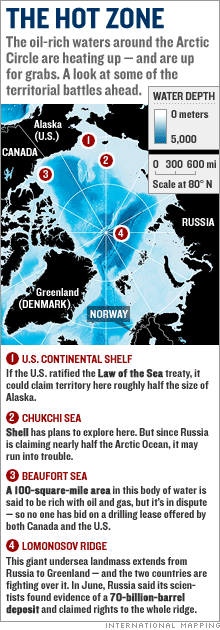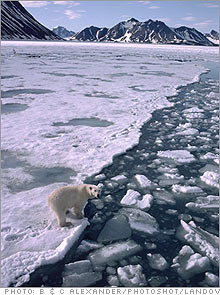The great Arctic Circle oil rushMelting icecaps are giving way to oil-rich waters -- that the U.S. can't claim, writes Fortune's Telis Demos.(Fortune Magazine) -- It's an irony that even Al Gore might appreciate. As global warming causes the polar icecaps to recede, potentially oil-rich seabeds are being uncovered beneath the Arctic Circle in the suddenly navigable -- and drillable -- territory. The area has long been thought to hold substantial reserves: Some say up to 25% of the world's undiscovered oil and natural gas may lie below the thawing ice.
 But as the countries bordering the Arctic hammer out who can lay claim to what parts of the ocean, one major player is missing: the U.S. Why? Because of an unlikely spat between Big Oil and a group of Republicans over the UN treaty that governs who can claim rights to those waters. Back in 1982, the United Nations Convention on the Law of the Sea went into effect, a treaty that defined ocean boundaries and set up regulations for ship traffic. The U.S. signed the treaty in 1994, but the Senate refused to ratify it, opposing the idea of UN sovereignty. But what was then just a diplomatic absence is now seen as a lapse in judgment that could cost billions of dollars. Under Law of the Sea, countries are entitled to control any waters above landmasses that extend from their continental shelf. If the U.S. were to claim that entitlement, it would gain Arctic territory roughly half the size of Alaska. But since the U.S. is not a party to the treaty, many worry that it won't have a say before the North Pole is sliced up for good. What's in the way? A small but vocal group of Senate Republicans who are fiercely opposed to participation -- and the notion that UN panels could trump U.S. control over resources. Frank Gaffney, a former Reagan advisor and current president of the Center for Security Policy, has called the treaty the "most egregious transfer of American sovereignty, wealth, and power to the UN." Senator James Inhofe (R-Oklahoma) has said he'll use "whatever means it takes" to keep the U.S. from joining the treaty. That included leading the charge to kill a bill that surfaced for ratification in 2004. While there has been little commercial Arctic exploration so far, the potential is huge. London-based consultancy Wood Mackenzie estimates that at least 166 billion barrels of oil and gas might lie undiscovered in the near-shore Arctic. There could be much more in areas closer to the North Pole. In potential U.S. territory alone there could be 15 billion barrels. With global reserves falling, any sizable field would be a prize. An Arctic land grab is already well underway. In early June, Russian scientists claimed they found evidence of 70 billion barrels of oil and natural gas reserves on the Lomonosov Ridge, a huge rock formation that extends through the North Pole from Siberia to Greenland. Russia has slapped a claim on nearly half the Arctic -- a territory of half a million square miles -- and granted a monopoly to its own companies to exploit it. Denmark is crying foul, saying it, too, has rights to the ridge. The U.S. could play a huge diplomatic role in any negotiation, and without its involvement, many feel the borders will never truly be settled. "It makes exploration a lot more risky," says Paul Kelly, former general counsel at drilling firm Rowan Cos., since bankers, he says, won't put up the money for ventures in "murky waters." The oil lobby has been working furiously to push past its Senate detractors -- and it is making some unlikely bedfellows in the process. Lobbyists representing companies including Exxon Mobil (Charts, Fortune 500), Chevron (Charts, Fortune 500), and ConocoPhillips (Charts, Fortune 500) are allying with environmental groups, who want UN protection for Arctic wildlife and ecosystems, as well as with the U.S. Navy, which says it won't be able to patrol the Arctic effectively without the rights the treaty provides to the territory. The consortium got a big boost in May when President Bush came out in support of ratification, breaking ranks with many members of his own party. New hearings in the Senate Foreign Relations Committee are set for this fall. Should things go well, a bill could hit the Senate by the end of the year. Advocates are hopeful. "We've been pushing for this for years," says Brian Petty, a drilling industry lobbyist, "and I think now we'll finally get over the goal line." The region's recent turf wars, they say, may give the issue a new sense of urgency. "The Russians have made their claim," says a committee aide. "If we don't act fast, we're missing the boat." |
|

